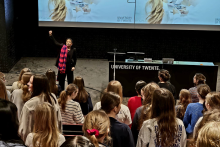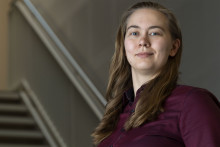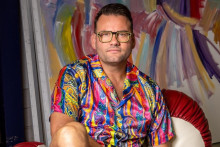‘Women are naturally more doubtful’
Marlène Hol started her company Mobina IT in 2015, in cooperation with her father René Hol and her boyfriend Jochem Verburg. ‘My dad has a lot of experience in the manufacturing industry, and when I was working on a study project for Computer Science we came up with the idea to combine my and Jochem’s knowledge about business and IT with my father’s knowledge.’ So they decided to build a web application to standardize and automate this information. ‘At the beginning of last year we started our pilot, which was quite a success. We are now busy with further developing the product and are now ready to enter the market.’

Marlène Hol
Hol is currently finishing her Master’s in Computer Science, but she does not feel that combining studies with her company is too much work: ‘I really like the combination of the practical side of Mobina and the theoretical side of my Master and how these strengthen each other, although the combination of both requires hard work. Vacations and weekends don’t exist anymore, but I like the work I do so much that it’s definitely worth it.’
‘Vacations and weekends don’t exist anymore’
Although the number of female entrepreneurs in the Netherlands has increased over the past few years, there are still significantly less female than male entrepreneurs. Hol has something to say about this difference: ‘I think women, in general, are a bit different from men in certain ways. Men are often just a bit more rational and risk-taking than women, but on the other hand women are often more likely to empathize with others, which also has a lot of advantages. I think men have more of a tendency to promote their own ideas, while women are naturally more doubtful whether their idea is a good one, they don’t take the risk as quickly.’
‘I have been working in a man’s world for a while now, but I think there are as many advantages as there are disadvantages in being a woman amongst a lot of men,’ continues Hol. ‘Sometimes you have to fight harder for something, but there are also things that will come easier. You don’t have to try to think and act like a man, but accept the fact that you’re a woman and embrace the strengths that come with it.’
‘I was a single mother of two kids who had to accept a lot of risks’
Dr. Biba Visnjicki is currently the director of Business Development at Fraunhofer Project Center at the UT. She started her own company CoddeL, which specializes in strategy execution, business development and innovation management consulting.
‘I’m from Serbia where I studied chemical engineering, worked at a few different companies where I had a commercial role. I came to the UT for my PHD in 2001. It was a very pleasant and fruitful experience. After finishing my PhD I worked at Demcon for three years leading a first valorisation program of UT called Business Accelerator. It was a period when we supported startup ideas and companies to start getting shape in their markets.

Biba Visnjicki
In that period one thing was clear to me: strategy and business development are hard competencies linked to very complex capabilities that need much more than just a common sense. I wanted to learn more and it had to be fast. For that reason, I started my company in 2008. The journey started in America by joining trainings and lectures on hands-on methodologies and tactics in strategy execution, business development and innovation management.’
It was not an easy decision for Visnjicki: ‘Starting my own business was quite a scary thing, I was a single mother of two kids who had to accept a lot of risks and uncertainties. But it was also a lot of fun: you learn new things and come in contact with many people. The learning curve is steep and you have to be very clear in what you want to achieve. In order to keep going in the right direction I tried not to focus on risks but on opportunities instead.’
‘I am almost always the only woman in the boardroom’
Visnjicki also thinks it can sometimes be challenging to be a woman in ‘a man’s world’: ‘I am almost always the only woman in the boardroom. In that setting, I believe, you have to prove your qualities in a much harder way than a man. But you just accept it, you do it and you don’t try to change the system, you try to find your place there and to feel comfortable with it. Nevertheless, in my experience, when your customers realize your value they follow you easier than they would follow a man. I always had a very good relationship with my customers, which was a big advantage.’
‘When looking at women in business, we should not forget that they are probably mothers as well. Their life is stretched between professional arena and home. They often have to make difficult choices in balancing the private and professional life. I do admit, my extraordinary effort to balance those two, with best intentions, did not always make me happy. But my family, my daughters and my partner are the best support one could only imagine, I am very grateful for them.’
‘I don’t like talking in stereotypes, but I think women tend to take less risks’
Annemieke Koster studied Communication Science at the UT and started her own textile factory ‘Enschede Textielstad’ in 2013. ‘After finishing my studies I worked as an online marketeer for a while, but I quit when I decided I wanted to start my own weaving mill.’
‘After Rana Plaza, a textile factory in Bangladesh, collapsed in 2013 a public debate started about how the textile industry should change to avoid similar disasters. I noticed that people were only paying attention to the ethics of the confection workshops, and did not question whether the raw materials that were used for their clothing was actually made ethically as well. I started a blog where I shared my findings about this topic, which sort of escalated into me giving the right example and starting my own factory.’

Annemieke Koster
Since Koster had no history in textiles, this was not as easy as she hoped: ‘I took quite a risk, I did not have a lot of savings and needed to gain a lot of knowledge about my product. I was lucky that I could come into contact with a lot of experts in the field, I was able to start creating my own fabric samples at the AC Ter Kuile. I got more and more customers and bought my own weaving machines. I really try to create sustainable products, so I use recycled and locally sourced raw materials.’
‘The primary focus is not on earning money’
‘My goal when starting this company was to change something in the textile industry, and I feel like I have really been able to contribute to that change. The primary focus is not on earning money but on being able to produce sustainable textiles. In the long term, I hope I can create workplaces for people who need it, I am trying to set up a project in cooperation with the ROC.’
Regarding the difference in number of male and female entrepreneurs, Koster thinks age is one of the main factors: ‘I do know a number of female entrepreneurs in Twente, but they are mostly only freelancers and mostly above 30. I don’t like talking in stereotypes, but I do think women tend to take less risks. They think about decisions more and longer and tend to first get more working experience or start a family before they think about starting their own company.’







